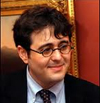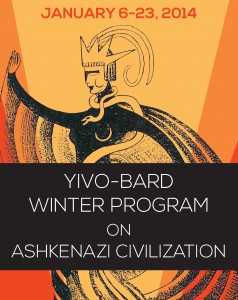Interview with Adam Kirsch—New York Intellectuals Revisited

Adam Kirsch is a senior editor at The New Republic and contributing editor for Tablet magazine. He is the author of Why Trilling Matters (Yale, 2011), The Modern Element: Essays on Contemporary Poetry, a Nextbook biography of Benjamin Disraeli, and two collections of poems, The Thousand Wells and Invasions.
For YIVO’s Winter Program (January 6-23rd, 2014), Kirsch will teach a course entitled “New York Intellectuals Revisited.” From the 1930s through the 1980s, a small group of mainly Jewish writers and thinkers known as the New York intellectuals helped to set the agenda for political and literary thought in America. In magazines like Partisan Review and Commentary, they charted their generation's complex relationship with Communism and Modernism. Many started on the far left and ended up as champions of neoconservatism. The class will explore the work of this seminal group.
Leah Falk spoke with Kirsch about the ideas behind the course, and why we should consider revisiting these writers today.
LF: You’re teaching a course called “New York Intellectuals Revisited.”Tell me a little bit about who these writers are, and what the occasions are for “revisiting” them now?
AK: The New York intellectuals were a group of writers and thinkers, mostly Jewish, who were at the forefront of political and artistic debates in America from the 1930s through the 1970s. They worked outside the academy, writing for small magazines like Partisan Review and Commentary, but they ended up having an outsize influence on the country’s intellectual agenda. In the course we will be reading essays by Irving Howe, Irving Kristol, Daniel Bell, Clement Greenberg, and Lionel Trilling, among others.
LF: Is it accurate to say that most of the writers you’ll explore balanced their energies between the literary and the political?
AK: One of the distinctive things about the New York Intellectuals is that their interests in culture and in politics reinforced one another. They started out in the Depression years as advocates of radical left-wing politics; but unlike many Communists, they embraced Modernism with all its complexities and difficulties. Over the decades the attempt to think about culture politically was one of the unifying themes of their work, even as their political beliefs moderated and, in some cases, turned into conservatism. We will read essays such as Clement Greenberg’s “Avant-Garde and Kitsch” and Lionel Trilling’s book The Liberal Imagination, in which this fusion of art and politics is demonstrated.
LF: I’m interested in how autobiography plays into the discussion of these writers’ work. They were mostly Jewish, and often had complicated relationships to their Jewishness. You’ve written, for example, about Alfred Kazin grappling with his Jewish identity and his origins in the Brownsville slums, a history that comes up in his journals, as well as occasionally in his own criticism. Do you think the inner lives of these writers play a role in their criticism?
AK: Being Jewish was at the center of the New York Intellectuals’ lives, even if they themselves sometimes didn’t acknowledge it. While they were not at all religious—these were mostly committed socialists—their outsider perspective on American culture, their interest in radical experiments, and their gradual embrace of America and what it stood for, all track with the journey of Jewish immigrants to assimilation in this country.
LF: You’re a poet as well as a critic and teacher. Did any of these writers struggle with the desire to lead both creative and critical lives?
AK: For the most part, these writers embraced the critical essay as their favorite form—they used the form to argue and analyze. Most of the things we’ll be reading in the course are essays and collections of essays. I don’t think most of them harbored any desire to be creative artists themselves, with the exception of Trilling, who did long to be a novelist and actually wrote one good novel about the world of the New York Intellectuals.
LF: Is there anyone writing today whom you would call an heir to the New York Intellectuals? Or has that ship sailed?

AK: I think their example continues to inspire writers—the idea that you can write about challenging political and artistic ideas in a non-academic way, for a small but committed general audience. The DNA of the New York Intellectuals is in magazines like The New Republic and The New York Review of Books, and new magazines like n+1 and The New Inquiry are clearly modeled on Partisan Review in its heyday.
LF: Who, in your view, is the ideal student for this course? Who will get the most out of it?
AK: Anyone who likes arguing about ideas, as the New York Intellectuals did—Jewish ideas, left-wing ideas, literary ideas, neoconservative ideas—will definitely enjoy spending time with these writers.
Register for the course (6 sessions, T/TH), 6:30 – 9:00 pm, 1/7-1/23
Leah Falk is YIVO’s Programs Coordinator.




